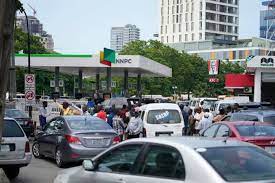South Korean Ambassador to Nigeria, Young-Chae Kim, has said that Nigerians and their neighbours can deal decisively with lingering insecurity issues bedevilling their country.
The Ambassador who spoke when in a briefing with Journalists to mark his 100 days in office said Nigeria like any other country has the primary duty of securing its territory.
Ambassador Kim however expressed his country’s readiness to equally colloborate with Nigeria defence to further resolve the insecurity problem.
He said, ‘‘Insecurity affects every aspect of life. To resolve the problem Nigeria needs international cooperation largely with its neighbouring countries. Nigeria needs to make peace in the region to enhance security.’’
Korea, he said aims to strengthen defense collaboration with Nigeria beyond the commercial between Korean companies and Nigeria’s Ministry of Defense via military exhibition of artillery, small arms, tankers, and sales of military vehicles by Kia and Hyundai automobile brands, to intelligence sharing.
‘‘Our military is number six in the world in military defense, and number 6 in the globe in military spending. Our new defense attaché, the first after a long time is strengthening Korea’s relationship with the Nigeria defense team
The proposed defense collaboration initiated by Kim’s predecessor Lee In Tae (rtd), Kim said demands one-on-one dialogue with both nations ministers of defense to set out modalities, and a scheduled invitation of Nigeria’s ministry of defense to Korea later in the year.
On business, the Korean envoy said the falling prices of oil and gas, delay in ports and shipping costs have negatively impacted bilateral trade between Korea and Nigeria.
He said the volume of trade between Korea and Nigeria fell from $4.6b in 2017 to $1.2bn in 2020 as a result of the decrease of the prices of oil and gas.
He also noted that the month-long delay in ports of exported and imported goods in and outside of Nigeria, in addition to the expensive shipping costs contributed to the steady decrease in trade between both countries in the past few years.
According to him, “Our survey of Korean companies on other obstacles to bilateral trade indicated that delays in the Apapa Port where they had to wait for a month to export products out of Nigeria, and another month’s wait on the sea to import their products into Nigeria are major challenges. These, and also the rise in shipping costs affect the competitiveness of Nigeria’s products negatively.
“We have to ensure that export-import are done by the private sector and not by government. government should be just middlemen, the facilitators. We have to make sure that private companies can do this easily; and that when they export ensure the shipping is efficient.”
The ambassador revealed that as part of bilateral cooperation with Nigeria, Korea has embarked on a trilateral cooperation project with Katsina State farmers and Dangote Group in rice production.




